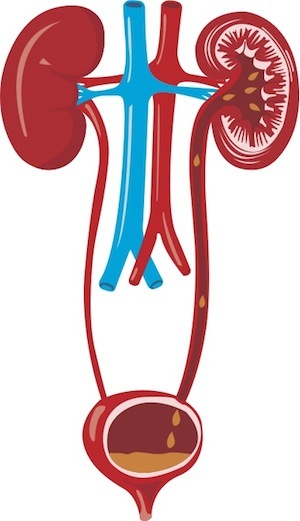10 Shocking Facts About Urinary Tract Infections |  |
| 10 Shocking Facts About Urinary Tract Infections Posted: 07 Jan 2014 07:00 AM PST  Urinary tract infections are uncomfortable and can lead to serious complications, even organ damage. Commonly referred to as UTI’s, the infection primarily targets the bladder and kidneys and has a nasty tendency to recur. Women, teens, and young children are most often afflicted but men can suffer from them as well. While UTI’s may seem like a straightforward infection for which antibiotics are the clear solution, they are anything but, and the following 10 facts will make that clear.
1. Antibiotics are not the AnswerMany of the bacteria, which cause UTI’s, have developed resistance to antibiotics and the impact is alarming! Multi-drug resistant pathogens, or MDRs, scoff at typical antibiotics and need to be addressed with a more aggressive, heavy-duty profile. [1] The Enterococci group of bacteria have specifically shown resistance to standard antibiotics. One test reported that nearly 70% of the Enterococci are resistant to several typical antibiotic options. [2] Those who suffer from recurring UTI’s face the concern of increased infection by antibiotic resistant bugs. [3] Clearly, prevention is the preferable measure in the battle against UTI’s. 2. Bacteria are not the Only CulpritHave you ever heard of schistosomiasis? It’s a disease caused by a harmful organism (a flatworm, specifically) and may cause UTI’s. There are four recorded types of schistosomiasis and if left untreated can lead to kidney disease and even bladder cancer. It infects 200 million people worldwide and one report has linked it to over 100,000 deaths every year. [4] Although it’s most common to Africa and the Middle East, it's on the move. An instance in Fiji was recently reported. [5] 3. Urinary Tract Infections Complicate DiabetesA recent study found that patients with diabetes run an increased risk of having drug resistant bacteria that cause urinary tract infections — especially if their diabetes is poorly regulated. [6] Another study found that both men and women with diabetes have a greater risk of developing urinary tract infections than others. [7] The most startling revelation is that urinary tract infections may even cause life threatening complications for diabetics. [8] 4. Pregnant Women Have Added RisksUnfortunately, the incidence of urinary tract infection increases for women during pregnancy. One study suggested an association between UTI’s and serious problems such as preterm birth and smaller than normal gestational age infants. To counteract recurring UTI’s during pregnancy, many women use natural remedies like cranberry juice, probiotics, or acupuncture. [9] 5. Obesity Increases Risk of UTI’s in MenA 2013 study examined how obesity affects the chances of developing a UTI. The results found that obese men are two times more likely to develop the UTI than obese women. [10] Another determined that obese men and women are more likely to develop UTI’s than the non-obese. They also had a greater chance of serious complications. [11] 6. Eye Damage May be a UTI ComplicationA urinary tract infection can lead to obvious complications, such as bladder and kidney damage; but it can also affect the eye. Although rare, when both kidneys are infected and left untreated, eyesight damage can occur. [12] 7. Rheumatoid Arthritis Linked to Higher Chance of InfectionPersons with rheumatoid arthritis visit the emergency room twice as often for UTI’s than persons without. For those visits, a recurring UTI, which required hospitalization, usually occurs within a year. One possible cause is that the use of oral steroids taken for rheumatoid arthritis may increase the occurrence of the UTI and recurring infection. [13] 8. UTI’s Can be a Common Problem for KidsOne in five children who suffer one UTI will experience another. Unfortunately, long-term studies have demonstrated little success with antibiotics. [14] Based on the research, prevention appears the best approach with a focus on education and proper care. For those children who do suffer from a UTI, cranberry juice may be effective. 9. Cranberry is an Excellent RemedyCranberry has long been used to address UTI’s and is recommended by many doctors. A review of several studies reported that cranberry was as effective as antibiotics, and produced no side effects. [15] Another randomized, placebo-controlled study reported that, over a 24-week period, women who consumed cranberry juice did not experience a recurrence of infection. [16] Cranberry juice with high concentrations of antioxidants, specifically proanthocyanidins, appears to be a helpful defense for UTI’s in children. [17] 10. Probiotics are a Better Defense than AntibioticsWith the ineffectiveness of antibiotics, research has turned to probiotics as a means to address urinary tract infections. Lactobacillus probiotic strains have demonstrated the best results. In one study, women who took this strain experienced significant improvements. [18] This particular probiotic bacteria also stimulates immune function, lowers acidity levels in the urinary tract, and discourages the growth of UTI causing organisms. [19] [20] What’s your preferred remedy for urinary tract infections? Leave a comment below and share it with us! -Dr. Edward F. Group III, DC, ND, DACBN, DCBCN, DABFM References:
The post 10 Shocking Facts About Urinary Tract Infections appeared first on Natural Health & Organic Living Blog. |
| You are subscribed to email updates from Natural Health & Organic Living Blog To stop receiving these emails, you may unsubscribe now. | Email delivery powered by Google |
| Google Inc., 20 West Kinzie, Chicago IL USA 60610 | |
No comments:
Post a Comment